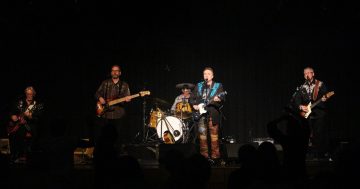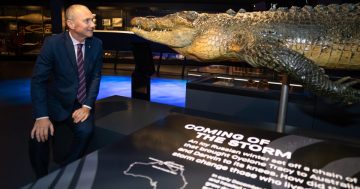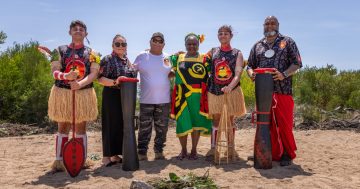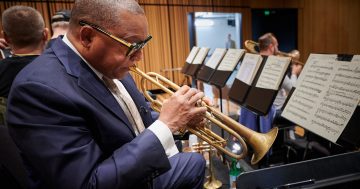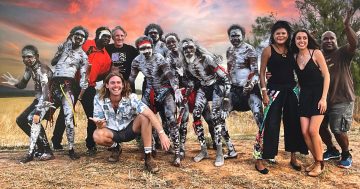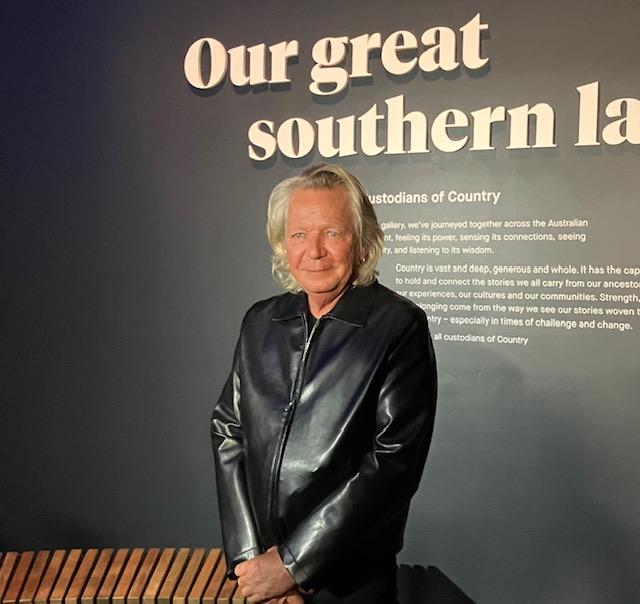
Iva Davies of Icehouse. Photo: Chris Johnson.
Icehouse frontman Iva Davies talks to Chris Johnson about that iconic song and the band’s return to Canberra.
It’s been 40 years since Iva Davies let the rest of Australia in on a song that was destined to become part of our psyche.
Yes, ‘Great Southern Land’ is four decades old – and still as young as ever.
To mark the anniversary, the Icehouse frontman brought his band to Canberra to help celebrate the National Museum of Australia’s new gallery named (you guessed it) Great Southern Land.
“I can actually go back and put myself in the predicament I was in when I wrote that song,” Davies told Region.
“We had had a massive debut album, but those songs were collected over three years of constantly playing.
“We’re talking about 10 songs developed over three years, and then suddenly I was faced with the prospect of writing a whole new album in a couple of months.”
The debut album from 1980 he refers to was titled Icehouse, but the band was then known as Flowers. Icehouse was adopted as the band’s name soon after the album’s release.
The Icehouse album peaked at number 4 on the Australian charts and spawned three top 20 hit singles ‘Can’t Help Myself‘, ‘We Can Get Together‘ and ‘Wall‘.
A follow-up album after such success can be a make-or-break point for a band. The well was dry and Icehouse had to come up with the goods if they wanted to stay on top.
And Iva Davies was the songwriter.
“I was freaking out. Literally freaking out,” he said.
“So when I completed that first song, ‘Great Southern Land‘, I raced into our manager’s office, and I said, ‘here, I’ve made a start, here’s the first one’, and that was all that was on my mind. You know – here’s the first one.
“So when they reacted the way they did it was like, ‘what? What, I’ve got nine to go?’ The reaction was completely unexpected and completely at odds with where my head was at at the time.”
Davies, who initially embarked on the album as a solo project before deciding it would be an Icehouse record, finished writing all the songs for the second album Primitive Man, which charted even better than the debut and gave Icehouse their most recognisable and popular song, ‘Great Southern Land‘.
It has sometimes been described as a whitefella singing about the land with the connection of a blackfella.
“That’s a strange perspective, really,” he says.
“To be honest with you, I knew I’d have to address the black, white, whatever in some way, shape or form.
“But I think the thing that kept me going as far as being able to write the song was simply imagining myself talking to a place and it talking to me, regardless of people.
“That is the voice that’s happening in every chorus. It’s me going, ‘I’m talking to you great southern land – you walk alone’.
“So it’s that dialogue that I think is even more important than blackfella, whitefella.”
Davies is a classically trained musician, and when asked, he concedes that such a grounding gave him an edge as a songwriter in the rock music genre.
“I must think differently. I think it’s certainly been a great advantage, understanding music that way,” he says.
“One of the great advantages it’s given me is that I’m able to analyse what I’m actually doing. And it’s always been very important to me not to repeat myself.
“So the information that I have technically about chord progressions and so forth, I can then refer to.
“It’s a language. To be able to read and write music is an extraordinary thing, and I’m very grateful that somebody took me aside when I was quite young because that’s the time to learn. By the time I was 14, I could speak another language.”
And speaking of being young, Icehouse is now a band that crosses generations – in its fan base and makeup.
Joining the old-timers in the band are a few youthful faces, including Michael Paynter, a former contestant on The Voice Australia.
Paynter joins in on guitar, keyboards and backing vocals. But Davies will also step away from the spotlight in most concerts, allowing Paynter to shine on lead vocals for a song or two.
Is that a deliberate generational change strategy for Icehouse?
“Not really. He’s just an enormous talent,” Davies says.
“I was made aware of him when Paul Gildea, our lead guitarist, discovered him. They’re both from Melbourne and Paul managed him for many years.
“At a certain point, I think just went ‘wow! We can really use you’. And he’s great to have around because he has that youthful energy.”
When Icehouse launched the new gallery at the NMA, they played a couple of short gigs, including their iconic song accompanied by special guest William Barton playing a haunting didgeridoo.
They also announced a special full, one-off concert at the museum for 4 November.
Icehouse is always well received in Canberra, but the frontman laments that they haven’t toured here often enough.
“We’ve been here far more rarely than you’d imagine,” he says.
“We used to in the early days. We played at the ANU and there were some regular gigs.
“But things have been quiet and the pandemic, of course, has not made things easy.
“So this is a great opportunity to come back.”
Great Southern Land is open at the National Museum of Australia. Entry is free. To book tickets for Icehouse on 4 November, visit Eventbrite.












